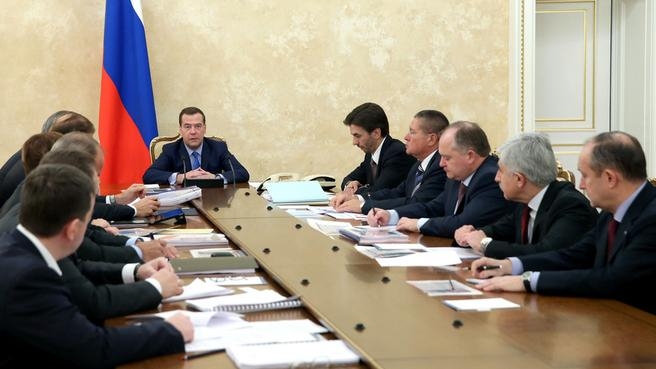Dmitry Medvedev: "This aircraft corporation aims to become the world’s third largest aircraft manufacturer by 2025 in terms of the number of military and civilian aircraft. In the shipbuilding sector, we plan to more than double labour efficiency by 2030 and to increase military exports to 25 percent and the share of civilian products to 22 percent."
Dmitry Medvedev’s opening remarks:
Good afternoon colleagues. We are meeting today to
discuss the long-term development programmes of two large joint-stock
companies, United Shipbuilding Corporation and United Aircraft Corporation.
Companies with state capital account for a substantial part of the country’s industrial output, at least a third, and for 40 percent of our spending on research and development. We agreed at a Government meeting early this year to focus on a number of aspects related to the development of state-owned companies, such as corporate management. We worked with the Government’s Expert Council to prepare balanced guidelines to this end. In short, the programmes these companies need to formulate and approve will be vital for assessing their management.
Dmitry Medvedev: "Companies with state capital account for a substantial part of the country’s industrial output, at least a third, and for 40 percent of our spending on research and development."
These ship and aircraft corporations were created for
an obvious reason – to consolidate the design and production potential of
individual companies, which worked only chaotically in the 1990s, and to
preserve, as much as possible, their personnel. On the other hand, we needed to
modernise companies and to improve the competitiveness of their products, that
is, aircraft and ships.
Until recently, these companies had to fend for themselves and didn’t really work together. Many of them survived only thanks to export contracts signed within the framework of military technical cooperation. But now they receive substantial funds for the production of military technology under state defence contracts; we continue to give them considerable assistance, despite any problems. We are also investing in their modernisation to ensure that they have enough contracts. However, these strategic industries need to stand more firmly on their feet, and so their contract portfolios should be diversified as much as possible. We need to develop and extend the amount of civilian products they produce, which is very important even if they do have a lot of defence contracts.
Dmitry Medvedev: "We plan to more than double labour efficiency in the shipbuilding sector by 2030. We also need to increase the share of shipbuilding exports under military-technical cooperation contracts from 10 to 25 percent and the share of civilian products to 22 percent."
I will say a few words about each of the programmes we’ll
discuss today. The companies that design and build ships and marine technology
have been integrated in United Shipbuilding Corporation. We must admit that we
are lagging far behind the leading global producers in this sector even on the
domestic market, not to mention the global market. This is a very specific and
difficult market, and the business itself is difficult too. However, we plan to
more than double labour efficiency in the shipbuilding sector by 2030. We also need to increase the share of shipbuilding exports under
military-technical cooperation contracts from 10 to 25 percent and the share of
civilian products to 22 percent.
I’d like to add that the prosperity of entire regions depends on the work and development of this sector, primarily the coastal regions where shipyards are mostly located, including our new regions of Sevastopol and Crimea, which need special attention.
Dmitry Medvedev: "United Aircraft Corporation plans to create the world’s third largest aircraft manufacturing centre in terms of production, after Boeing and Airbus, by 2025, and this concerns both military and civilian aircraft. To attain this goal, we need to take measures to increase labour efficiency nearly 7.5-fold compared to 2012."
United Aircraft Corporation plans to create the world’s third largest aircraft manufacturing centre in terms of production, after Boeing and Airbus, by 2025, and this concerns both military and civilian aircraft. To attain this goal, we need to take measures to increase labour efficiency nearly 7.5-fold compared to 2012. Another key goal is to increase the production of competitive civilian aircraft; their share in total output should increase from 30 to 50 percent.
We must work actively for the domestic market and also become established in foreign markets, including Southeast Asia, where a large part of Russian businesses is looking and where we have been trying to become established by joining various forums and looking for clients. This is not easy. Our work shouldn’t provoke any claims, and our products should be seen as competitive rivals of their foreign analogues.
Let’s talk about this.












